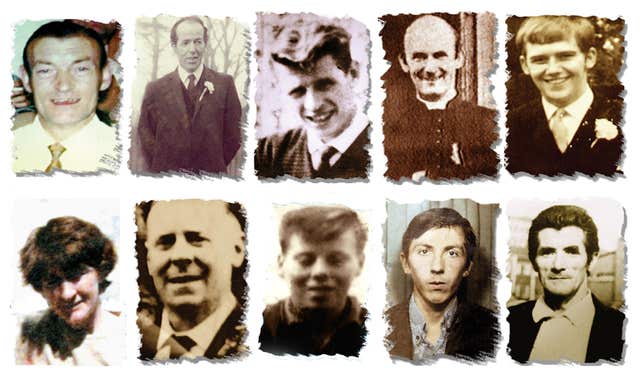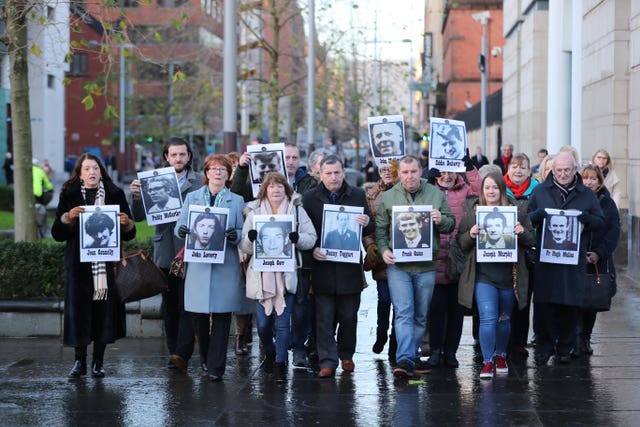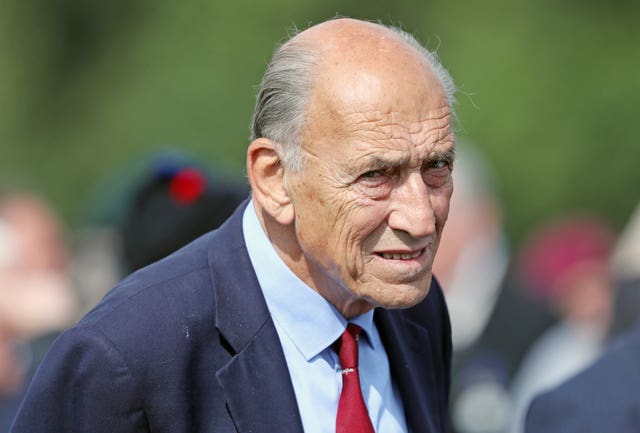
Fresh inquests into the fatal shootings of 10 people in west Belfast in 1971 came following two decades of campaigning by the bereaved families.
They contend the deaths in the Ballymurphy area were never thoroughly investigated.
One woman and nine men were killed in five separate incidents between August 9 and 11 involving the Army at a time of high tension following the controversial introduction of internment without trial.

Soldiers were greeted by disorder and violence as they moved into republican strongholds to arrest IRA suspects from the early hours of August 9 when the policy came into effect.
That there was disorder was not disputed, however the inquest heard conflicting views on whether the IRA had been present at any or all of the incidents.
Former members of the loyalist paramilitary Ulster Volunteer Force have claimed their organisation was also involved.
The families of those killed – who included a mother of eight and a Catholic priest – contend they were innocent, unarmed civilians shot by soldiers without justification.
They have expressed hope the inquest findings will clear their names.

Presiding coroner Mrs Justice Siobhan Keegan started hearing fresh inquests into the deaths in November 2018.
Eye-witness accounts and forensic evidence were heard and more than 60 former soldiers appeared at Belfast Coroner’s Court across 100 days of oral hearings which concluded in March 2020.
Former head of the British Army General Sir Mike Jackson and previous Sinn Fein president Gerry Adams were among the witnesses.
In August 1971 Sir Mike was a captain in the Parachute Regiment on deployment in Belfast acting as community relations and press liaison.
He dismissed a suggestion that there had been an attempt to “cover up” the shooting of two of the 10 – Joseph Corr and John Laverty on August 11 – in reference to some soldiers involved in the shootings having not been interviewed by the Royal Military Police at the time.

“It is a preposterous accusation to make which would require a huge number of people to be part of. It simply does not add up,” he told the inquest.
“It may be there was a breakdown in procedure, it may be that the whole system was overwhelmed by the mayhem of that week, I don’t know.
“But I do know we (British Army) don’t do conspiracies.”
Sir Mike contended that during the incident on the Whiterock Road on August 11 soldiers had been in a gun battle with the IRA.
“I have absolutely no doubt that the IRA were firing on soldiers and soldiers were firing on the IRA,” he said.
During his appearance at the inquest in May 2019, Gerry Adams denied membership of the IRA and said while he did not have direct knowledge of the Provisional IRA’s actions, he understood it ordered no engagement with the British Army on August 9.
He said there had been a rumour in the area that a gunman from the Official IRA had fired on the Henry Taggart Memorial Hall where the Army was based, but added that the “bush telegraph” in those days was “sometimes accurate and sometimes inaccurate”.
He said it had been a “sensible decision” by the Provisional IRA not to “engage the British Army”, for the “safety of the community and safety of the volunteers”.


Comments: Our rules
We want our comments to be a lively and valuable part of our community - a place where readers can debate and engage with the most important local issues. The ability to comment on our stories is a privilege, not a right, however, and that privilege may be withdrawn if it is abused or misused.
Please report any comments that break our rules.
Read the rules here